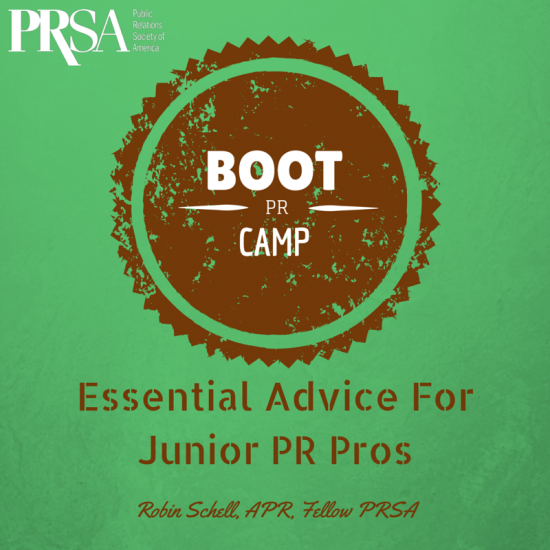At this year’s PRSA International Conference we had the opportunity to meet with a number of recent college graduates excited to enter the profession and, even better, those who’ve landed jobs across the country and are hitting the ground running. While some of these junior practitioners are just entering the workforce, it was pleasantly surprising to hear that they are hungry for tips and information on how to be a better PR professional. Almost unanimously, the first few questions from those we met rounded out to “how can I be better at my job?”
While we’ve covered this question from many different angles throughout the year, there’s never a bad opportunity to provide advice on how to be a better pro. We thought this would be a perfect opportunity to touch base with Robin Schell, APR, Fellow PRSA in advance of her PR Boot Camp training session “Key Concepts and Techniques of Effective Public Relations” (Dec. 9 & 10) to learn some of the key tips to advancing ones PR career.
With more than 20 years of consulting experience, specializing in strategic planning, effective internal and external communication systems, constituency relations programs and behavioral research, Schell provides advice that can be used by junior practitioners and those preparing to enter the industry to stand out among the crowd.
Q. What job responsibilities should a new PR pro expect to tackle in their first year in the profession?
Robin Schell> This really depends on the position they have accepted. In a smaller PR firm they may be expected to work on a wide variety of accounts, where bigger firms might have junior people on teams specializing in a particular type of PR or a very specific industry. Most new PR pros are expected to have a solid understanding of social media – just don’t get pigeonholed in that role.
Q. Why is it important to avoid getting pigeonholed in social? Isn’t that the most important place to be right now?
RS> I think most employers expect young people to be well-versed in social media skills, but you don’t want to put yourself in a position of limiting what you do to only that. Social media is one tool in the toolbox of the PR professional – but there is a lot more to PR than social media!
Q. What’s the difference between a strategy and a tactic, and how do you differentiate between the two?
RS> A strategy is more the approach you are taking while a tactic is the activity that will support the behavior you are trying to achieve. For example, if an airline has a goal of hiring a certain percentage of just-out-of-college employees in the next year, one strategy might be to use current employees to help them recruit future employees. The tactics could include testimonial ads by employees in the target demographic, an incentive program for employees (e.g. $500 for every new employee they refer that gets hired), staffing job fair booths with employees who are one or two years out of college who have had a positive experience with the airline.
Q. How do you avoid creating a #PRFail moment? Are there any steps that a person can take or things to consider before putting together a PR plan?
RS> Research is key to the success of any PR plan; what you know about your target audience going in, what you still need to find out and how you use research to monitor progress/make mid-course corrections…as well as how you use it to measure success.
Q. Once a junior PR pro has made it through the interview and landed the job, what are the top three skills that an employer is looking for them to build?
RS> It is hard to speak for all employers, but things we typically look for are:
- The ability to build and maintain good relationships (whether with clients, fellow employees or key contacts of the audiences we are working with)
- The ability to work under pressure and multi-task (good organizational skills)
- The ability to present with confidence.
Q. Although someone might be junior or new in the PR field, how can they help themselves to stand out? What are a few skills that they can focus on to help put them ahead of the competition?
RS> Showing that you are an interested learner is key…someone who has volunteered for an interesting organization, or taken a variety of opportunities (internships, jobs etc.)… someone who can show that they adapt to change easily.
Q. Any other advice for starting a career on a solid footing?
RS> Network, network, network. Join and get involved in PRSA and/or other professional organizations. Then use this great network of senior people you’ve met for advice along the way.
Robin Schell, APR, Fellow PRSA is a Senior Counsel & Partner at Jackson Jackson & Wagner. Read more about Schell’s PR Boot Camp session and register to attend the training on PRSA.org. Connect with her on LinkedIn.
—
Laurent Lawrence is associate director of public relations at the Public Relations Society of America








This is some great insight for us future PR pros! I definitely think it is important to highlight the advice on not getting pigeonholed in a social media role. Most PR students have a good understanding of social media, but what seems to be more important is learning how to leverage those skills.
Great tips. I can see the issue with getting pigeonhold, especialy when it comes to social media. Sometimes I feel sightly pigeonhold in my role, but I try to embrace it and teach others when appropriate.
These tips are great. I appreciate you sharing your knowledge with “Jr. PR Pros” it’s also helpful for those of us considering a change in careers. I also think you advice to young professionals not to get pigeonholed in an exclusively “social” position.